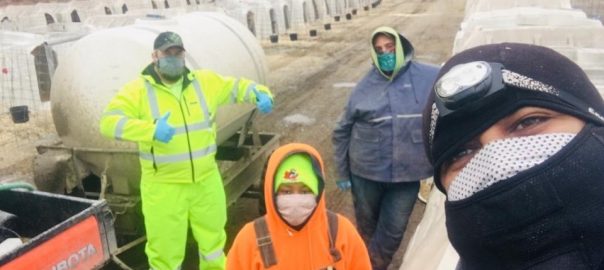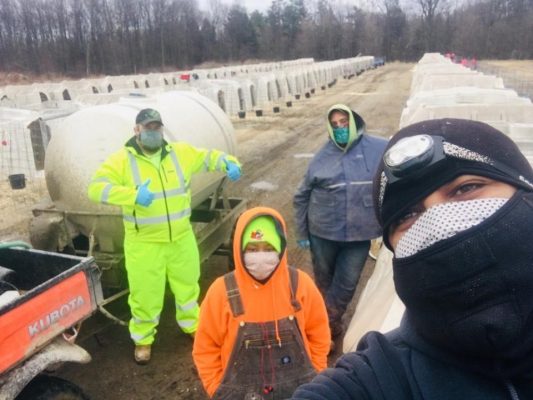
FARMING, WORKER SAFETY AND OUR FOOD SUPPLY: IT ALL MATTERS IN A PANDEMIC

This past week, I had one of those tough days on the farm. To top it off, our skid steer got stuck in the mud. Not just stuck but buried to the top of the wheel frame. It was a fitting metaphor of what is happening on farms all over this great state. Many feel stuck amid the pandemic, spinning our wheels to keep going but not able to get anywhere. That hole seems to be getting deeper.
Every small business is impacted in some way, and that includes our family farms. While many stores and gathering places were forced to close their doors, farms that produce food kept working. The government calls our workplaces essential, and rightfully so. We all must eat. However, many of the customers that purchase from us, did go away. Schools shut down. Restaurants forced to do take-out only. Coffee shops didn’t need our milk for lattes. Overnight, markets ceased to exist. In turn, the processors that buy our raw products to produce and package them into consumer goods didn’t need our food either. Either they had no one to sell too or couldn’t quickly reformat their processing lines to tailor to the needs of the grocery stores to meet the surging demand there.
This major disruption in the food supply chain has left far-reaching ramifications. Commodity prices that farmers earn fell by double digits, often well below the cost of production. Some farms were left with the worst possible scenario, to dispose of their milk, cabbage and onions. Farms generally don’t have the ability to process the food on-site, like pasteurizing and bottling milk. Instead it goes to a milk plant where it becomes cheese or chocolate milk. Other obstacles right now include transportation issues or a lack of storage for the perishable goods. There are many variables that must gel for the food supply chain to work. Food waste is the last thing any farmer wants to see. We take pride in producing nutrious food. We want people to be able to consume what we grow and produce. Plus, being able to sell it provides an income for our families and employees.
This can be a confusing time for consumers. Our food systems are complex and there are a lot of factors that go into ensuring there is food on the grocery shelves and on our family’s tables. Rest assured, our farms are doing all they can to keep things moving as best as possible. We are still farming. We will make sure work continues, that means working to mitigate the spread of the virus amongst our families and employees.
Everyone on the farm has a vested interest to take this pandemic seriously. While no one person or place are immune, there have been major steps taken across the board to keep everyone on the farm as healthy as possible. This includes working to protect the men and women who work on our farms. They are invaluable in food production. New York Farm Bureau and our partners with New York State, Cornell’s Agricultural Workforce Program and extension offices, NY Center for Agricultural Medicine and Health and other agricultural organizations have been providing the latest health and safety guidance, numerous educational resources, signage to post around the farm, as well as informational webinars and videos in English and Spanish to educate farms and their employees about the proper response. We have also been in discussions with officials to direct needed personal protective equipment (PPE) to farms that may be having difficulty keeping up with the supply shortages, as well as to address housing and quarantine needs should a worker be exposed.
Farm Bureau has also been in touch with community health providers and New York State agencies to elevate resource needs because access to health care can be a challenge for everyone in some rural areas. We are looking to help facilitate increased on-farm testing and medical care where it is needed for farmers and farmworkers alike.
Farm Bureau also has a great relationship with our partners at Feeding New York State and its regional food banks. Last year alone, farmers donated more than seven million pounds of food to people in need, and we are working to facilitate greater food donations wherever possible. Some of our county Farm Bureaus are assisting with local donation efforts, and we are grateful that USDA is granting our organization’s request to logistically help purchase and move more food into the hands of people across this state and country who especially need assistance right now.
Farmers are helpers by their very nature. They respond to adversity because challenges come with being a farmer. Many things are out of our control right now, for everyone in and out of agriculture. What is in your control is supporting farmers where you can. Don’t forget to pick up that gallon of milk or pint of ice cream. Support your local restaurant by ordering take out, cheese pizza anyone? Look into signing up for a CSA share, buy a gift certificate from your local nursery or riding stable, use real New York maple syrup on your pancakes. Most of all, remember that we need food production in New York State if we want to continue to feed ourselves. This whole pandemic has reinforced the need for food security, but we can’t have that if our farms aren’t secure, able to produce and stay in business.
No one wants to see the economy rebound more than farmers. We are hopeful rural New York can get back on its feet soon in whatever the new normal looks like. We understand how we must do this with the care and safety of our communities in mind and will work with our leaders to make this as efficient and smart as possible, perhaps in ways different than in our state’s urban communities.
Back on my farm, I was able to get the skid steer out of the thick muck of mud. I hooked it up to our tractor and pulled it out. Was it messy? Yes. Did it slow things down? Sure. But in the end, we made it happen. Just like our farms will do during this pandemic and when we come out of it together on the other side.
David Fisher is President of the New York Farm Bureau.
